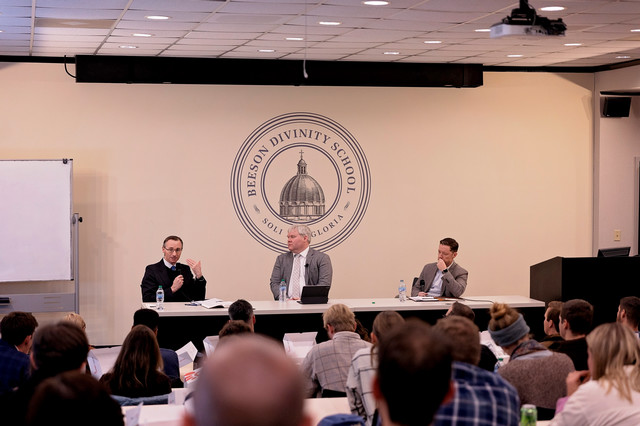
Christopher Watkin, lecturer at Australia’s Monash University and author of the highly acclaimed book Biblical Critical Theory, spent time at Samford University’s Beeson Divinity School on Nov. 11. During his campus visit, Watkin delivered a chapel sermon and joined a discussion about his recent contributions to a new work.
Watkin, along with Joshua Chatraw, Beeson’s Billy Graham Chair of Evangelism and Cultural Engagement, contributed to The Gospel After Christendom, a collection of essays by fellows from The Keller Center for Cultural Apologetics. The book was edited by Collin Hansen, who serves as an adjunct professor at Beeson and sits on the advisory board. Hansen also serves as vice president for content and editor in chief of The Gospel Coalition. The book aims to “define cultural apologetics, explain its biblical and historical grounding and demonstrate its importance for the church today.”
Watkin, Chatraw and Hansen’s conversation will serve as an episode of Hansen’s podcast, Gospelbound.
Watkin said the biblical record demonstrates the apostles and prophets commending God’s “timeless Gospel” to specific cultural contexts. Chatraw added the best apologists in Christian history have been very aware of their context, communicating the Gospel by understanding their culture’s idols, fears and more, rather than an approach to apologetics that sees the defense for Christianity as an intellectual exercise in facts removed from historical contexts.
“The argumentation style of apologetics can devolve into a back-and-forth that more resembles Alabama and Auburn fans arguing which team is better,” Chatraw said.
“We yell for our team, and other fans of our team cheer as we call the others ‘losers.’ Is that working? I would say it isn’t.”
While there is room for different apologetic approaches, Watkin emphasized the need to remember that we aren’t Jesus, who perfectly understood what to say to whom at certain times.
“We don’t have 20/20 vision,” Watkin said. “Jesus could get it right every time. The problem with us is we can treat Pharisees like the woman caught in adultery and treat the woman caught in adultery like the Pharisees. That’s why we need each other in the church.”
A Right Sort of Worship
In his sermon, “Too Many For Their Own Good,” Watkin walked through the text of Judges 7:1-8, where God whittles down the army of Israel, led by Gideon, to 300 men to take on the large army of the Midianites. The passage showed a “wrong sort of victory and a right sort of worship,” Watkin said.
“The concern for God was that if the Israelites won by their own strength, they would boast and forget that God is the one who saved them. If we aren’t careful, we can fall into the same trap,” he said.
“The way you think you’re saved will shape the way you worship,” Watkin said.
“The concern is the kind of people the Israelites, and we, are becoming throughout our lives.”
There are easy ways around problems, such as using generative AI to write essays, Watkin said. But taking those shortcuts means “robbing ourselves of that growth.”
“The whole point is the resistance. That’s how we grow,” Watkin said.
